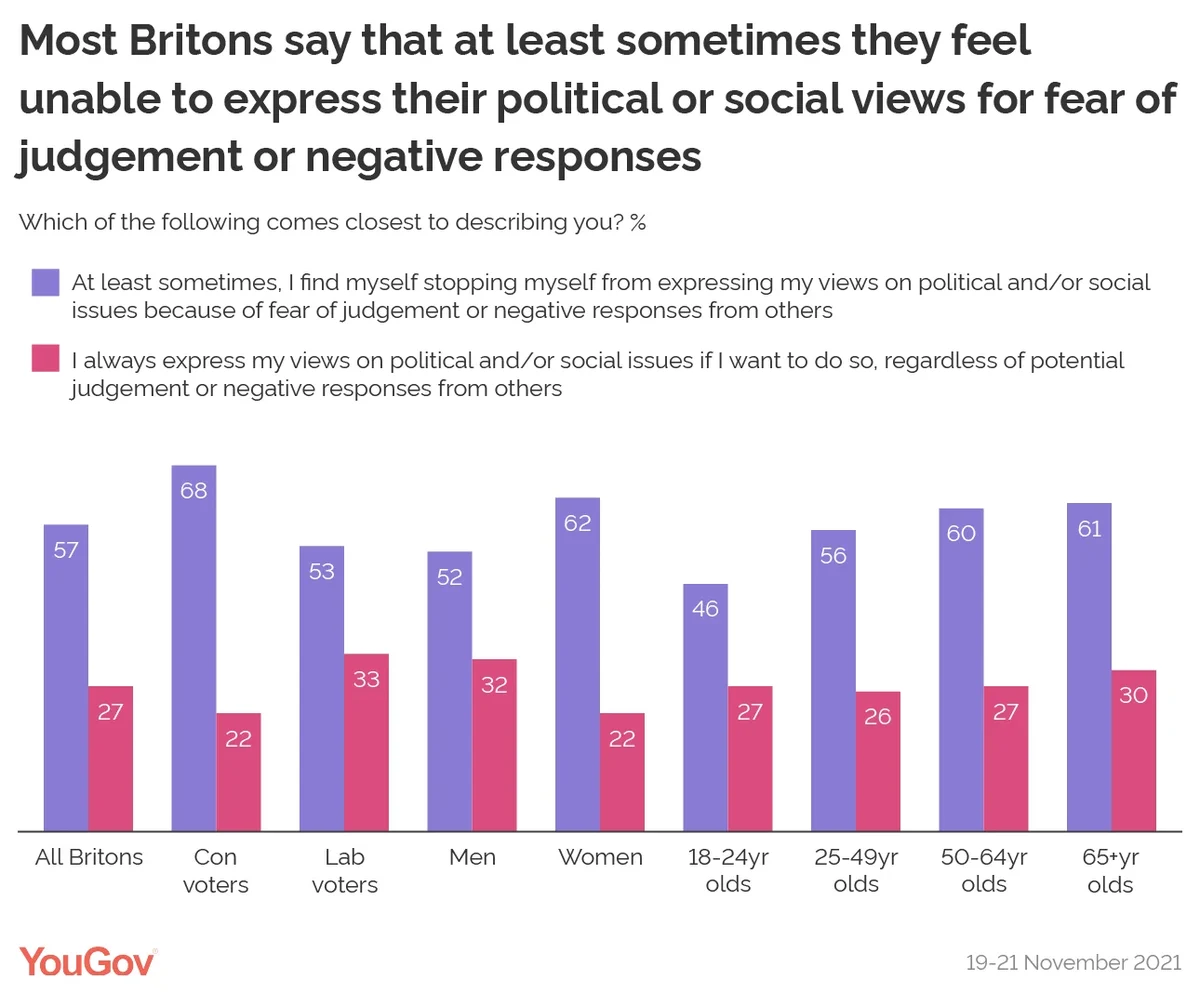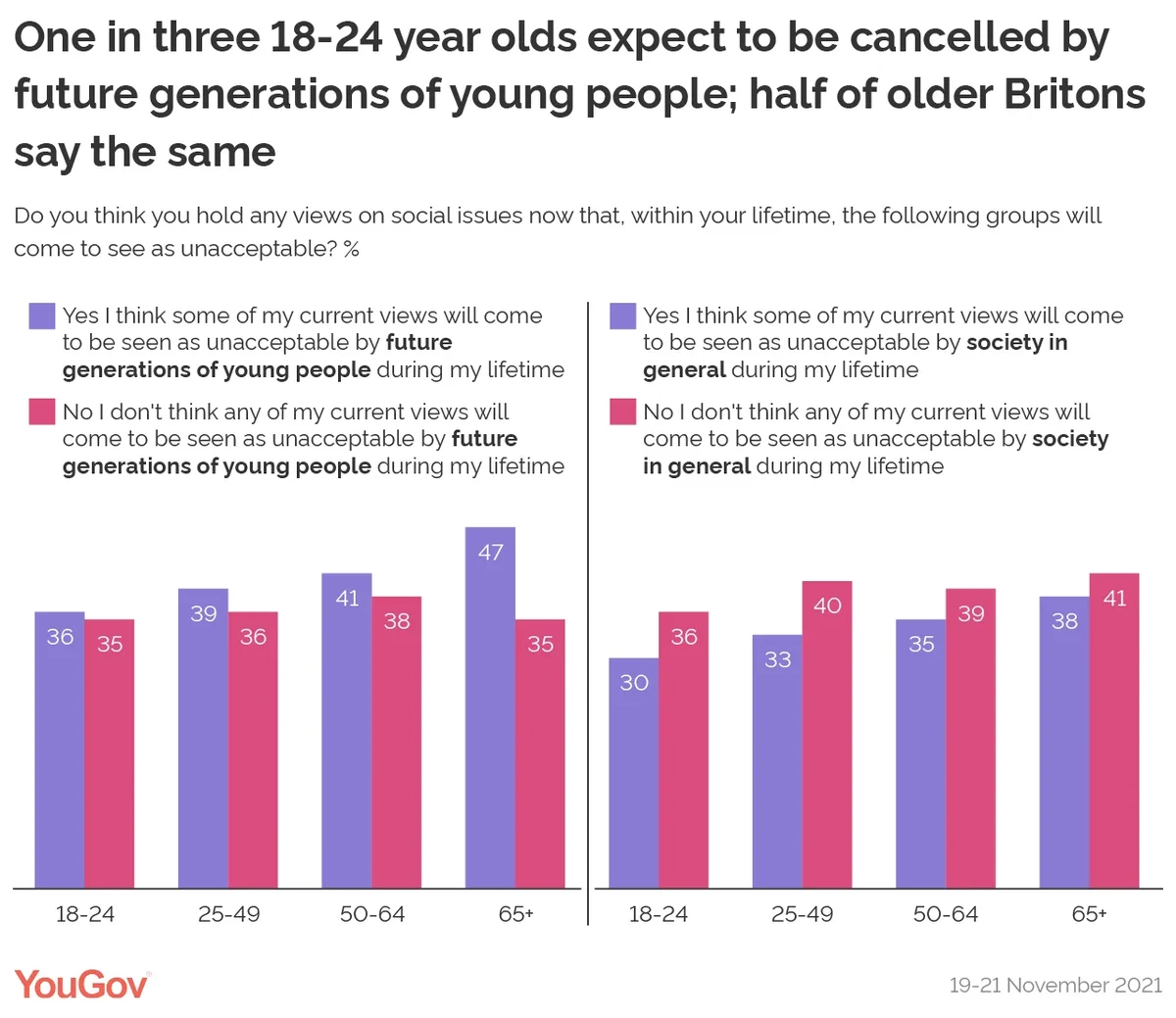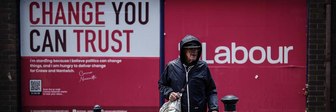Those with less progressive views on divisive social topics feel more reluctant to voice their opinion
One of the new political catchphrases of recent years has been “cancel culture”. As with so many Westminster Bubble terms, it is an import from the United States, and refers to a desire or attempts to ostracise (or ‘cancel’) people or organisations with certain viewpoints, generally those that are considered un-progressive.
As we found with our earlier study on another American political import – being ‘woke’ – Britons don’t know what the political elite are on about when they bring up cancel culture.
Only a third of Britons (35%) say they think they know what cancel culture means. Almost two thirds don’t know what it means (65%), including close to four in ten who’ve never heard the expression in the first place (38%).
Young people are more familiar with cancel culture, with 45% of 18-24 year olds saying they know what it is, compared to 40% of 25-49 year olds, 31% of 50-64 year olds, and 26% of those aged 65 and above.
In fact, approaching half of 65+ year olds have never heard the term used in the first place (45%), twice as many as 18-24 year olds (23%).
Most Britons say that at least sometimes they feel unable to express their political or social views for fear of judgement or negative responses
While most Britons aren’t familiar with ‘cancel culture’ as a phrase, that’s not to say Britons don’t feel 'cancelled' from time to time.
A majority of Britons (57%) say they have, at least sometimes, found themselves stopping themselves from expressing their political or social views for fear of judgement or negative responses from others.
Conservative voters are more likely to say so than Labour voters (68% vs 53%), although notably most people in both groups feel this way. Women are also more likely to have held their tongue than men (62% vs 52%).

Only a quarter of Britons (27%) say they always express their political or social views if they want to do so, regardless of potential judgement.
When have people kept quiet about their views?
This is not to suggest that any example of someone holding back is an example of cancel culture. Asked in what circumstances people have kept their lips zipped, Britons are most likely to do so with people they’ve only just met (49%), perhaps an understandable occasion on which to avoid a potential argument.
Likewise, four in ten Britons (40%) have done so at work, while one in three (34%) have avoided speaking their mind on social media, 31% have done so among friends, and 21% while with their family.
What views are Britons reluctant to express?
What views do people feel like they can’t express? To test this, we asked Britons a series of wedge questions on several divisive topics to see what side of an argument they came down on. Then we asked how often they find themselves hiding their views on those topics for fear of negativity.
In most cases, those holding what might be considered the ‘un-progressive’ view more frequently omit their opinions on that topic.
For example, those who believe immigration has generally been a bad thing for the UK are more likely to say they always or mostly have to hide their views on the subject of immigration levels to the UK (33%) than those who think immigration has been a good thing for the UK (10%). This is the topic on which people are most likely to say they feel they have to keep quiet.
Other top views people are more reluctant to express are the belief that ethnic minorities in Britain have things as good as white Britons, with 31% who hold this view feel they can’t ever or mostly can’t say so, and transgender issues, which 29% of those who disagree with the statement “a transgender woman is a woman” feel they have to frequently keep bottled up.
The exceptions to this trend are views on the British Empire and obesity, where both sides of the argument reported similar levels of reluctance to express themselves. When it came to views on the Conservative party, although there is not much difference at the always/mostly level, those with pro-Tory views are more likely to say they sometimes or rarely have to hide that fact than those with a negative opinion of the party.
Across all nine scenarios, only about 10-14% of those who sit on the more progressive side of the argument say they feel they always/sometimes have to keep their opinion to themselves.
“I used to be with ‘it’, but then they changed what ‘it’ was. Now what I’m with isn’t ‘it’ anymore and what’s ‘it’ seems weird and scary. It’ll happen to you!”
Comedian Ricky Gervais, who has been an outspoken critic of cancel culture, predicted recently that the views that young people hold today will in turn come to be seen as backward by future generations
"I wanna live long enough to see the younger generation not be woke enough for the next generation. It's going to happen. Don't they realise that, it's like, they're next. That's what's funny.”
It seems that, indeed, young people do not expect to become the bad guys. Only one in three 18-24 year olds (36%) think that some of their current views will come to be seen as unacceptable by future generations of young people during their own lifetime. An equal number (35%) anticipate their own future cancellation, however, while 29% are unsure.

By contrast, almost half of the oldest Britons (47% of those aged 65 and above) expect some of their views to be seen as bad by future youngsters. One in three nevertheless are sure they’ll hold acceptable views until they die (35%).
What should we prioritise more: protecting free speech or stopping offensive and hateful speech?
Underpinning the whole cancel culture argument is the dilemma of how far societies should go to preserve free speech when that right is often exercised in ways ranging from the hurtful to the malicious.
Asked which should be the priority, 38% of Britons say the focus should be on protecting free speech, while 43% say protecting people from offensive or hateful speech should be the priority.
Men are much more concerned about protecting free speech and women are more concerned about blocking offensive/hateful speech. Likewise, Tories and Labour voters come down on opposite sides. Younger people are also much more concerned about protecting against offensive/hateful speech than protecting free speech, while older Britons are split between the two.











